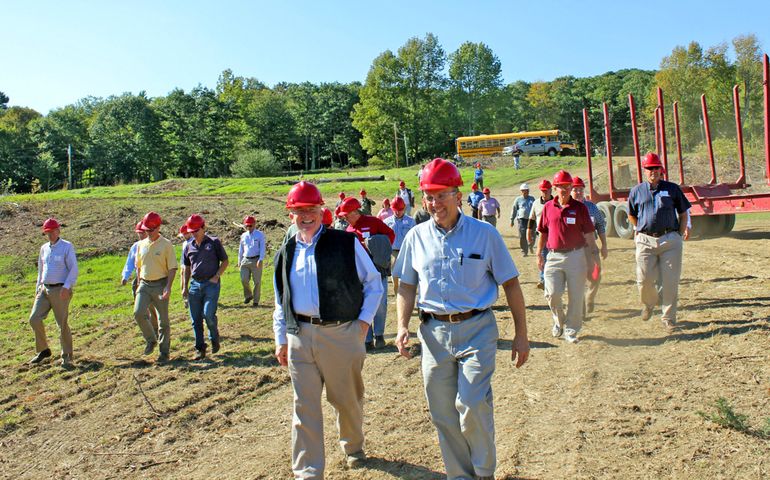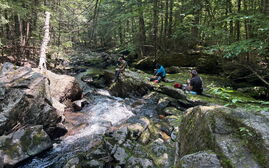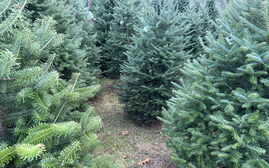Processing Your Payment
Please do not leave this page until complete. This can take a few moments.
- News
-
Editions
View Digital Editions
Biweekly Issues
- December 15, 2025
- December 1, 2025
- Nov. 17, 2025
- November 03, 2025
- October 20, 2025
- October 6, 2025
- + More
Special Editions
- Lists
- Viewpoints
-
Our Events
Event Info
Award Honorees
- Calendar
- Biz Marketplace
20 on '20: Evolving forest products industry aims for more progress
 Courtesy / Maine Forest Products Council
Patrick Strauch, front left, executive director of the Maine Forest Products Council, say the key to 2020 will be finding workers.
Courtesy / Maine Forest Products Council
Patrick Strauch, front left, executive director of the Maine Forest Products Council, say the key to 2020 will be finding workers.
A collaborative strategic planning process, workforce development initiatives and a continued focus on new technology will keep the forest products industry moving forward, Patrick Strauch, executive director of the Maine Forest Products Council says. The key is to find workers.
“We’re seeing a market change take place and we want to make sure we’re diversifying our economy and looking for the right opportunities,” Strauch says.
“No one has forgotten that from 2014 to 2016, five pulp-paper mills closed, thousands of jobs were lost, and those losses affected families and communities across the state,” Strauch says. “But adversity has also pushed our industry forward. In the past few years we’ve seen — in just a back-of-the-envelope tally — about $1 billion in investments, which have revitalized Maine’s forest products industry.”
He said the FOR/Maine forest economy economic roadmap, a collaborative effort that is looking to grow the industry 40% by 2025, is the major focus. “We call it Maine’s New Forest Economy,” he said. “Our goal is to increase our capacity to harvest wood and manufacture more wood products, from lumber, to tissue paper, to biobased plastics. To reach that goal, we’ll need more trained workers and continued support from policymakers and the public. There are a lot of challenges ahead, but also a lot of opportunities.”
The industry is hoping potential workers “take another look at our industry and consider working with us,” especially those who love the Maine outdoors.
“This is not your grandfather’s forest products industry, it really is a new forest economy,” one people can make a career in. “And you don’t have to leave Maine. You can build a great career at home,” Strauch says.
One of the challenges the industry faces are regulations that make it harder to do business in Maine, he says. “Our state is almost always ranked as among of the worst states in which to do business. We’re making progress and I know we can do better.”
That’s especially necessary as capital investment competition is fierce in the forest industry.
Specific things to keep an eye on are a successful revival of the Nine Dragons Old Town mill, the start-up of the new Pleasant River sawmill in Enfield and keep an eye on what happens with GO Lab’s wood insulation plant at the former Madison Paper Mill.
Strauch is on Gov. Janet Mills’ Climate Change Council, and one of the goals for 2020 is to help people understand the role Maine’s forests and wood manufacturer already play in the mitigation effort.
“We’re green,” he says. “We’re the good guys. If you look at the current accounting, our forests probably eat up more than half of the emissions that are out there right now and our wood products serve as carbon sinks and replacements for petroleum-based products.”
Mainebiz web partners
Related Content

The Giving Guide
The Giving Guide helps nonprofits have the opportunity to showcase and differentiate their organizations so that businesses better understand how they can contribute to a nonprofit’s mission and work.
Learn More
Work for ME
Work for ME is a workforce development tool to help Maine’s employers target Maine’s emerging workforce. Work for ME highlights each industry, its impact on Maine’s economy, the jobs available to entry-level workers, the training and education needed to get a career started.
Learn More
Groundbreaking Maine
Whether you’re a developer, financer, architect, or industry enthusiast, Groundbreaking Maine is crafted to be your go-to source for valuable insights in Maine’s real estate and construction community.
Learn more-
The Giving Guide
The Giving Guide helps nonprofits have the opportunity to showcase and differentiate their organizations so that businesses better understand how they can contribute to a nonprofit’s mission and work.
-
Work for ME
Work for ME is a workforce development tool to help Maine’s employers target Maine’s emerging workforce. Work for ME highlights each industry, its impact on Maine’s economy, the jobs available to entry-level workers, the training and education needed to get a career started.
-
Groundbreaking Maine
Whether you’re a developer, financer, architect, or industry enthusiast, Groundbreaking Maine is crafted to be your go-to source for valuable insights in Maine’s real estate and construction community.
ABOUT
NEW ENGLAND BUSINESS MEDIA SITES
No articles left
Get access now
In order to use this feature, we need some information from you. You can also login or register for a free account.
By clicking submit you are agreeing to our cookie usage and Privacy Policy
Already have an account? Login
Already have an account? Login
Want to create an account? Register
Get access now
In order to use this feature, we need some information from you. You can also login or register for a free account.
By clicking submit you are agreeing to our cookie usage and Privacy Policy
Already have an account? Login
Already have an account? Login
Want to create an account? Register











0 Comments